
Richard Burton, Peter Firth, Joan Plowright, Jenny Agutter, Colin Blakely
Directed by Sidney Lumet
Written by Peter Shaffer, adapted from his play
“And now, for me; it never stops. The voice of Equus, out of the cave: ‘Why me?, ‘Why me?, account for me.”
– Dr Martin Dysart
A remarkable film, EQUUS is adapted from the hit play by Sir Peter Shaffer and is both a psychological thriller, a case-study in bizarre theology, and a bonafide horror picture.
One of the most unique and troubling stories committed to script and film, EQUUS involves child psychiatrist Martin Dysart (played by the legendary Richard Burton), who takes on the strange case of one Alan Strang, who has been committed after a staggeringly violent incident where the 17-year old blinded six horses in a stable using a sickle.
As Dysart (who has his own wretched demons) begins to uncover why Strang did such a thing, he entrenches himself into the troubled psyche of a young man who worships, at times sexually, an equestrian demigod in full, disturbingly creative devotion. The professional line between therapist and patient begins to blur as Dysart realizes that the adoration that Strang has for ‘Equus”, his horse god, is more honest and pure than anything the therapist has ever had in his life, and he is burdened with what to do.
For his work in EQUUS, Burton received his last of seven Oscar nominations (for Best Actor) is one of his greatest roles. Equal parts disgusted and jealous of Strang and his passions, Burton’s opening and closing monologues are poignant self-reflections of an aging professional’s sudden realization that the cure is worse than the disease; that by “fixing” Strang, he would be as emotionally neutered and lifeless as Dysart himself.

Peter Firth plays Strang with earnest brilliance; it can be safely said that it’s a career peak – think Timothy Hutton in ORDINARY PEOPLE (1980) – and Firth’s commitment to the role is clear. He rides a horse bareback in the nude while charging at high speeds spouting a litany of bizarre monotheistic jabber in an unbroken sequence, he flagellates himself in front of his idol with a bit in his mouth. The 24-year old was rewarded with an Academy Award nomination as well, for Best Supporting.
Jenny Agutter, Joan Plowright and Colin Blakely provide solid acting in their supporting roles; as his lover and parents, respectively.
For the production, masterful director Sidney Lumet transitioned the play from stage to screen by incorporating actual horses instead of costumed actors, the twilight bucolic outdoors of rural England instead of small multi-use sets, and, slagged for this by critics, did not shirk from showing blood. Cameraman Oswald Harris – who as a former Lancaster bomber RAF pilot as well as a former caddy to Michael Powell should have his own film made – cannily carries a sense of dread throughout the film through a voyeuristic approach to the horror as it unfolds. Technique of zoom focus carries weight throughout, whether watching Mr. Strang as he cringes, watching his son pray to Equus, or magnifying Burton’s brooding intensity in a slow zoom on his face wreathed in dappled shadow, so that all the contours of his burdened face are exemplified.
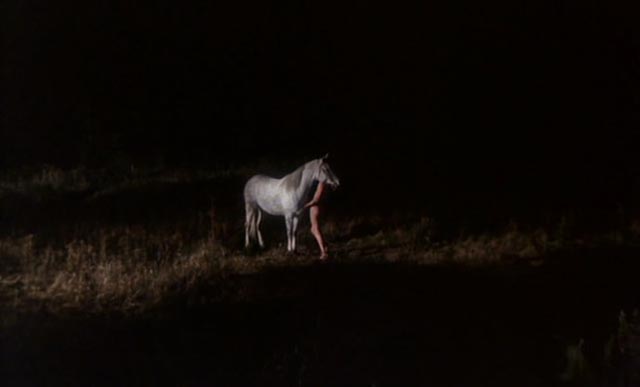
An exceptionally understated short score by Richard Rodney Bennett adds unsettling discordant strings to the most bizarre and macabre events of the story, allowing the vast, sumptuous dialogue its own melody.
A true hidden gem amongst more storied works from Burton and Lumet, Equus is a troubling, masterful treat from the late Seventies.

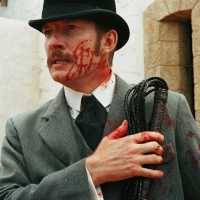
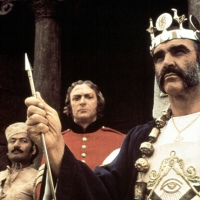
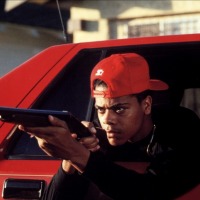
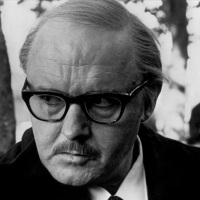

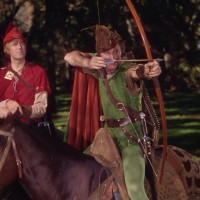
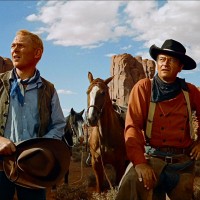
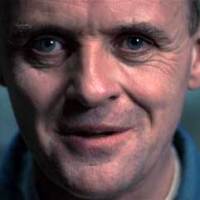



You must be logged in to post a comment.